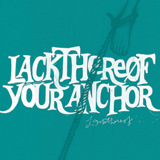
Lackthereof
Your Anchor
(Barsuk; 2008)
By Colin McGowan | 27 August 2008
To be as brief as humanly possible, Your Anchor has been a personal pacifier of sorts in the past couple weeks; in the throes of a nervous, regretful fit, Danny Seim’s warm and disintegrating timbre has been a source of consolation, some ugly keepsake to stuff beneath my pillow at night. Which: fuck me if I’m missing the point of this deceptively pleasant stroll through the dreadful muck of relationship woes and sensations of uselessness, but Your Anchor‘s charmingly fuzzy bass parts and vocals (like soft hands) mask some heavy emotions. We’re talking emotions concerned about heaviness and under that weight a record serving as an exploration of Seim’s dissatisfaction with feeling a burden to those close to him.
Earlier this year, Seim posited he was but a phantom to loved ones (My Haunted), listlessly wandering about, but ultimately ignored. Your Anchor—which has to be a companion piece or a corollary, at the very least, to My Haunted—switches poles, as Seim transforms from transparent figure to painfully apparent burden. To paint these two releases as opposing forces, though, would be a stretch. The albums share decidedly mellow musical approaches that differ mostly in terms of the prominence of their arrangements’ percussion: where My Haunted was almost completely devoid of percussive elements, relying heavily of acoustic guitar and echo-y atmospherics, Your Anchor features crisp, if understated, drums to accompany its comparatively bombastic range of instrumentation. Themes from the two records even seem to overlap on the creepy “Vacant Eyes” as Seim cries: “You broke through an unlocked door / You don’t seem to care.”
But to delineate every dissimilarity and thematic link is exhaustive and pointless, especially when Your Anchor is substantially excellent enough to be examined on its own. What renders it so engrossing is the way it carefully shades its angst, subtly shifting in pace, tempering its bleakness with humor, its somber organs with insistent clacks. The best representation of this may be found in Seim’s lyricism. For opener “Chest Pass,” slight, spry guitars and bouncy bass give way to a damning fact: “I’m your anchor / Tried and true / Makes sense that you’d want to move / This Hell’s not big enough for two.” This jarring assertion is enunciated purposefully in the midst of sleepy intonations, seemingly recited from lines of smeared ink. Because the thickest malaises yield the most startling, if brief, moments of clarity, amiright?
The instrumentation, which at first whips by in fleece-y billows, even whimsically, yields, upon multiple listens, ponderous qualities. Subdued guitars, lonely keyboards, and soft, wavering vocals feebly attempt to pierce the walls of despair and anxiety constructed by Seim’s despondent musings, which, in their odd, poetic nature and apt imagery, stand starkly against the pseudo-soothing arrangements. In contrast, National cover “Fake Empire,” the album’s would-be-cataclysmic-were-it-not-so-fucking-depressing closer (which was recorded initially for CMG’s own 2007 Fantasy Podcast), is where the compositions cease to provide comfort, capitulating as dread transforms from bothersome thoughts to all-encompassing entity: sparse keys, rising, droning fuzz, and the slightest rush of a cymbal floating in and out of the mix as Seim’s tenor inflects inexplicable weariness.
So Seim leaves the listener with a desolate ballad, bereft of any comforting undertones, which is purposeful in that it makes repeat listenings mandatory—to end a seemingly innocuous paragraph of depression with an exclamation point of sorts forces one to further mine the preceding material—and combing through the tender proclamations found in the album’s first 28 minutes enables a satisfying realization: what seems a pretty good little album is actually a touching, fully-formed document, too quaint for its profundity, too urgent to be so easily dismissed.





